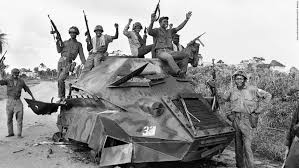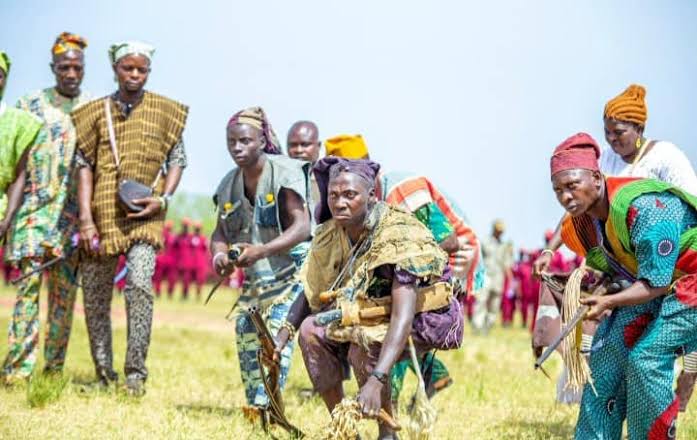
November 17, 1993, Gen. Sani Abacha leads a military coup in Nigeria that overthrows the government of Ernest Shonekan.
Young John onwa December Adekunle #asuu Hausa
Young John onwa December Adekunle #asuu Hausa

on November 10, 1993, the Shonekan-led ING was declared illegal in a ruling at the Lagos High Court presided over by Justice Dolapo Akinsanya. Back in October, as previously noted, a case had been brought by Moshood Abiola and
Baba Gana Kingibe to declare the ING illegal, null and void. The lead Attorney for the Federal Ministry of Justice, Mr. Dele Jegede, advised the court that Decree # 61, which was supposedly the legal basis of the ING, did not exist.
Decree #56 had previously fixed August 27, 1993 as the date of commencement of the 1989 constitution. Justice Akinsanya reasoned that since Babangida had divested himself of power by signing Decree # 59 of August 26th, he had no power to sign Decree # 61.
All of this dovetailed nicely into General Abacha’s original skillful backdating of the effective date of Babangida’s retirement to August 26th.
The day after the Court Judgement, Professor Bolaji Akinyemi publicly pleaded with General Sani Abacha to rescue Nigeria from a " terrible political and legal quagmire". But Abacha, ever so patient and disciplined regarding the timing of
coups resisted being rushed before crossing his “Ts” and dotting his “Is”. After all the ING was contesting the Akinsanya judgement in a higher court and Abacha still had to watch his flanks within the military carefully.
There was still the matter of how to handle the Chief of Army Staff, Lt. Gen. Aliyu Gusau Mohammed, who was not a man to be underrated.
On November 15, 1993, however, the Nigerian Labor Congress called a General Strike. On November 16, 1993, the Senate began open hearings on the fuel price increase by the Shonekan Administration while the House of Representatives asked the ING to rescind the price increase.
The next day, on November 17th at about 10 am, Generals Sani Abacha, Oladipo Diya and Aliyu Gusau arrived at the Presidential Villa in Abuja accompanied by truckloads of fearsome looking soldiers. These troops were under the command of two “Lagos Group” conspirators, namely
Colonel Lawan Gwadabe of the National Guard and Brigadier Bashir Magashe of the Brigade of Guards. Magashe was almost certainly there to make sure Gwadabe followed the Abacha script and no other. Following a ‘private meeting’ with Chief Ernest Shonekan,
Shonekan was graciously allowed to deliver a farewell speech to the ING after 82 days of controversy, following which he was flown to Lagos.
Gen Abacha took over the government finally as Head of State.
Gen Abacha took over the government finally as Head of State.
Thanks for reading, kindly follow us on all social media platform @Naijabiography_ and visit our website naijabiography.com for more fascinating story and event.
• • •
Missing some Tweet in this thread? You can try to
force a refresh





















